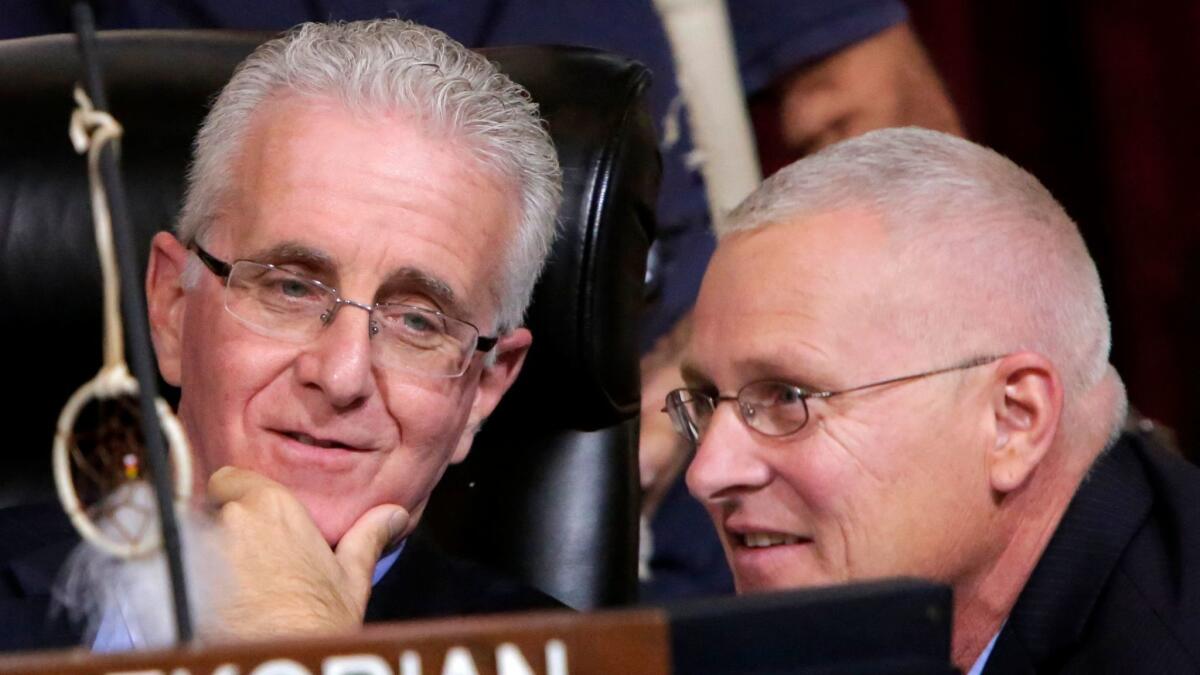L.A. lawmakers sign off on $9.2-billion budget

- Share via
The Los Angeles City Council voted Thursday to approve a $9.2-billion spending plan for the coming fiscal year, striking a last-minute deal that ensures funding for street safety initiatives as well as the repair of badly damaged roads.
The budget contains about $24 million for Vision Zero, a program designed to eliminate traffic deaths in L.A. by 2025, according to chief legislative analyst Sharon Tso. The council allotted more than $33 million to fix city streets that have received a D or F ranking, she said.
The compromise, lawmakers said, will allow the city to begin addressing two competing needs.
“It’s been unfortunate that the debate has somewhat devolved into this binary choice — that it’s either street reconstruction or it’s Vision Zero,” said Councilman Paul Krekorian, who heads the Budget and Finance Committee. “It’s my contention that there is a significant overlap of mission between those two.”
In fact, some corridors slated for major repairs also will receive Vision Zero safety improvements, such as upgraded intersections.
The plan for street spending was by far the most contentious topic in this year’s deliberations over Mayor Eric Garcetti’s budget proposal, which covers the 2017-2018 fiscal year. As part of Thursday’s budget vote, the council also agreed to:
• Hire an additional 75 firefighters.
• Place $10 million into a fund that could be tapped later in the year to pay for police overtime.
• Spend $176 million on homelessness programs — billed as the largest amount in city history, thanks to dedicated revenue from Measure HHH, the property tax increase passed by voters in November.
Los Angeles is expected to face a structural deficit — a gap between spending and revenue — in each of the next few years. And, officials warned, balancing the budget could become even more difficult.
Two city employee pension boards will meet this summer to consider reducing their investment earnings assumptions. If they scale back by a quarter percent, the general fund budget — which pays for basic services — will be saddled with an additional $100 million in yearly retirement costs.
Much of the spending increase in the upcoming budget will be covered by funds generated through Measure M, the transportation tax voters approved last fall. That money, and the arrival of new state gas tax revenue, set off a debate among council members over how transportation funds should be divvied up.
Garcetti released a budget last month calling for a major expansion in spending on Vision Zero. But the council’s Budget and Finance Committee last week recommended that funding for the program be moved into the city’s “unappropriated balance” — a pot of money where specific spending decisions are made at a later date.
Council members Mike Bonin and Nury Martinez protested that move, as did advocates for safer pedestrian crossings, bicycle lanes and other street safety improvements. They argued that Garcetti and council members were going back on a promise to seriously address the city’s traffic fatalities, which increased 43% last year.
“We said we wanted to put real resources into ensuring that people did not die on their way to school,” said Martinez, who represents part of the San Fernando Valley. “This budget as presented to us ... didn’t have that commitment, and I was very alarmed by it.”
The council reversed course this week, allocating funds to specific Vision Zero programs such as bus stop security lighting and traffic signals. Bonin welcomed the move, saying the council had allocated $27.2 million for various street safety initiatives.
Matt Szabo, Garcetti’s deputy chief of staff, said the budget approved by the council “delivers on the promises made to voters when they raised taxes to fix the roads and solve the homeless crisis.”
“This was never about picking winners and losers,” he said. “The mayor proposed a budget that fixes our streets and makes them safer, and that’s what the council ultimately adopted.”
Twitter: @DavidZahniser
More to Read
Sign up for Essential California
The most important California stories and recommendations in your inbox every morning.
You may occasionally receive promotional content from the Los Angeles Times.














